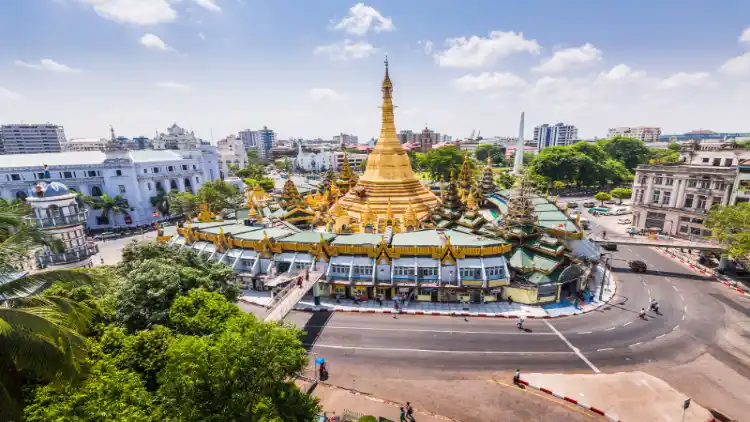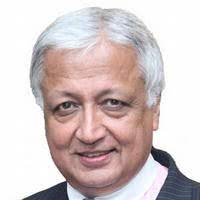

 Deepak Chopra
Deepak Chopra
In conflict situations, we talk about graded escalation of violence. In cases where regimes have been toppled or ousted or denied their rights through the electoral process, we see noncooperation with the usurper and street demonstrations. Initially, efforts are made to discuss and negotiate, nationally and internationally (the last leads to strong statements and then sanctions).
When this seems not to have the desired effect, we witness the next stage that is confrontation, or a low, controllable level of violence. When that too doesn’t seem to have an impact, and the world has other priorities, the aggrieved party takes up arms and a full-fledged civil war erupts. It can last for decades and no one wins
The two words that make people uncomfortable in Myanmar are "Army" and "China", even though Myanmar was the first country with which China amicably resolved a border dispute. In the 1960s, China provided funds and weapons to the Burma Communist Party, the largest anti-government armed group in Myanmar at the time, and relations between China and Myanmar's military government deteriorated rapidly.
In its nascent years, owing to the general support given to Nationalist China (Taiwan) by the United States, Burma stopped accepting U.S. aid and also rejected all foreign aid. By 1958, Burma was well on the road to peace and economic recovery, but then came the first military coup in 1962. China was the first country to recognize Myanmar's military junta. A military-controlled one-party (Burma Socialist Programme Party (BSPP) system was established.
Communist and ethnic insurgencies expanded in the eastern and northern parts of the country throughout the BSPP period.
By the early 1980s, however, growth was being hindered by mounting trade deficits caused by falling commodity export prices, the increasing costs of imports, and rising external debt payments.
Myanmar’s present challenges are the Chinese debt-traps and Chinese-backed militants in northern Myanmar territories. There is no doubt that the Myanmar military, having regained political power in 2011, was counting on China's support for the time being. However, it was the military that recognized the risk of depending too much on China in the first place. The 2021 military junta is confident that the West will not intervene militarily – it is too preoccupied with other things.
China's response to the coup d'etat in Myanmar on 1 February 2021 was quiet, merely describing the country as a "friendly neighbour.” Perhaps it was difficult for Beijing to acknowledge the political drama in a country that shares a border of over 2,000 km. The present internal conflict in Myanmar is influenced by a series of insurgencies in Myanmar that began shortly after independence from the United Kingdom in 1948. The conflict has largely been ethnic-based, with several ethnic armed groups fighting Myanmar's armed forces, the Tatmadaw, for self-determination. Weapons are thus relatively freely available, as are drugs to buy whatever is needed.
Despite numerous ceasefires and the creation of autonomous self-administered zones in 2008, many groups continue to call for independence, increased autonomy, or the federalisation of the country. The state-run Xinhua News Agency described the February 2021 overthrow of the civilian government by the Myanmar military as a "major cabinet reshuffle." China thinks that such words can win over a nation treated as an international pariah
The first phase in Myanmar of direct military rule was from 1962-1974 followed by the Constitutional Dictatorship phase from 1974 to 1988. In late 1987 widespread anti-government rioting broke out in the major cities and was followed in the spring and summer of 1988 by even larger student-led protests. Student and worker unrest had erupted periodically throughout the 1980s, but the intensity of the protests in the summer of 1988 made it seem as if the country were on the verge of revolution.
In September 1988 the armed forces seized control of the government. The military moved to suppress the demonstrations, and thousands of unarmed protesters were killed. Martial law was imposed over most of the country, and the constitutional government was replaced by a new military body called the State Law and order Restoration Council (SLORC).
The government resorted to brutal measures to suppress the uprisings that included killing hundreds of unarmed demonstrators and jailing thousands more. Martial law was imposed over most of the country. Aung San Suu Kyi who had returned from the U.K. appeared on the political stage and was placed under house arrest.
International condemnation of the military regime was strong and widespread, both for its bloody repression of the demonstrations in 1988 and for its actions in connection with the 1990 elections. Calling on the military to honour the results of the 1990 elections, the United States invoked economic sanctions against Myanmar in 1997 and restricted contact between the two countries.
The European Union (EU) subsequently restricted trade and interaction with the SPDC, and the United Nations continued to condemn human rights violations and forced labour of prisoners. Throughout the 1990s, the military solidified its political and economic hold on the country.
To guarantee its control of the economy if it relinquished titular power, the military also formed two conglomerates, comprising various domestic businesses and joint ventures with foreign firms. After decades of self-imposed isolation and international neglect, Myanmar assumed greater strategic and economic importance in the Asian region in the years leading up to the 21st century.
The migration of more than one million Chinese into Myanmar, massive Chinese support for the junta in the form of military equipment and infrastructure assistance, and the desire of the Chinese to open trade through Myanmar to the Bay of Bengal are major currents today
When the U.S. and Europe tightened economic sanctions on Myanmar after 1997, China, which had emerged as an economic power, supported Myanmar as a major investor and importer – it is clear that the military junta survived the Western sanctions because of China. In 2011, following a 2010 general election, and a nominally civilian government was installed. The same year, Myanmar announced a freeze on the construction of the Myitsone Dam, which was being built jointly with China on the upper reaches of the Irrawaddy River. The project had long been criticized for its impact on the environment.
In 2014, a project to jointly build a railroad from China's Yunnan Province to Kyawpyu in western Myanmar was also cancelled due to domestic opposition in Myanmar. Needless to say, China expressed its displeasure.
After decades of self-imposed isolation and international neglect, Myanmar nevertheless assumed greater strategic and economic importance in the Asian region in the years leading up to the 21st century
In 1997 Myanmar was admitted into the Association of Southeast Asian Nations (ASEAN) (a group that tacitly sought to strengthen the economic and political conditions of Myanmar and also curbing the Chinese influence.
The country’s last parliamentary election was held on November 8, 2020. Polls were not held in some sections of the country, however, with the election commission citing the insecurity from ongoing unrest between the military and armed ethnic groups. The NLD of Aung San Suu Kyi won a clear majority of seats in both legislative chambers, gaining more seats than it had won in 2015, while the military-aligned USDP saw its number of seats decrease.
The military rejected the results, alleging that the election had been tainted by fraud and irregularities, and called for the polls to be rerun. The electoral commission rejected these claims, saying that there was no evidence of fraud or irregularities widespread enough to have affected the outcome of the election.
The military also asked the government to delay the opening of parliament, scheduled for early February, but the government rejected the request. On February 1, 2021 - the day that parliament was scheduled to meet for the first time since the election - the military seized power.
It promised elections after the end of the yearlong state of emergency, then, exactly six months later, said elections would be held after two years. The head of the junta proclaimed himself Prime Minister.
The coup was widely condemned internationally, and within Myanmar, citizens held large protests and engaged in acts of civil disobedience that the military brutally repressed. Of late there have been reports that civilians are seeking military training and weapons from rebel groups operating in Myanmar. Nonviolence as an approach has been replaced by armed conflict as the latest clashes show
The influx in India (especially into Mizoram) of Myanmar nationals, who say they are police officers fleeing junta orders to shoot at unarmed demonstrators has put India in a sensitive position
The global community should impose targeted economic sanctions on the junta and maintain sustained political pressure on it. The United States and some other countries have imposed sanctions on senior generals and some military businesses, but action at the UN has made little progress. The higher the economic cost imposed on a state, the more likely it is that the state will change its policy line.
A state with economic problems will be more vulnerable to a sanctions’ regime. Even an autocrat with little concern for the welfare of his people will have difficulty managing a state on the brink of chaos. In this case, regime change is not a good goal; regime restoration is.
Efforts to achieve a political solution to the crisis have ground to a halt with the Association of Southeast Asian Nations (ASEAN), the 10-member regional grouping, which also includes Myanmar, making little headway on the Five-Point Consensus it agreed with the junta in April 2021
The National Unity Government, meanwhile, formed out of the remnants of Aung San Suu Kyi’s ousted administration in exile or hiding, has also made little headway in its attempt to regain control of the country. Now the two sides are gearing up for a critical diplomatic battle in the United Nations where the Credentials Committee is scheduled to convene in September to decide who should have Myanmar’s seat.
The junta captured many levers of State power, the purse strings of Myanmar’s Treasury and the administrative offices, but has not taken control of the nation and its people who roundly view the junta as illegitimate and, indeed, a terrorist scourge set loose upon them.
By July 2021, the Chinese virus was ravaging Myanmar.
People were scrambling for hospital beds and looking for oxygen for their COVID-hit family members and friends. Corpses piled up in cemeteries.
Neither the military, despite its de facto power, nor the parallel government, with its international influence, has managed to turn the tide of the pandemic or break the political stalemate.
The World Bank’s latest economic report on 26 July 2021 warned that Myanmar’s economy faces a contraction of 18 per cent this year and a doubling of poverty as a result of the combined impact of the coup and COVID-19.
Al Jazeera quoted a foreign investor in Myanmar as saying: The economy is “in free fall…The junta is unable to govern in every sense of the word. They have also failed to manage the economic disruption brought by the pandemic-induced lockdown measures, on top of the political turmoil.”
Now, more than ever, we must recognise the courage of the people of Myanmar and choose the path of meaningful and sustained action.
While global action is focused on Afghanistan, patience is running out on all sides in Myanmar.
(Deepak Vohra is a senior diplomat, special Advisor to Prime Minister on Lesotho, South Sudan and Guinea-Bissau and Special Advisor to Ladakh Autonomous Hill Development Councils, Leh and Kargil)
